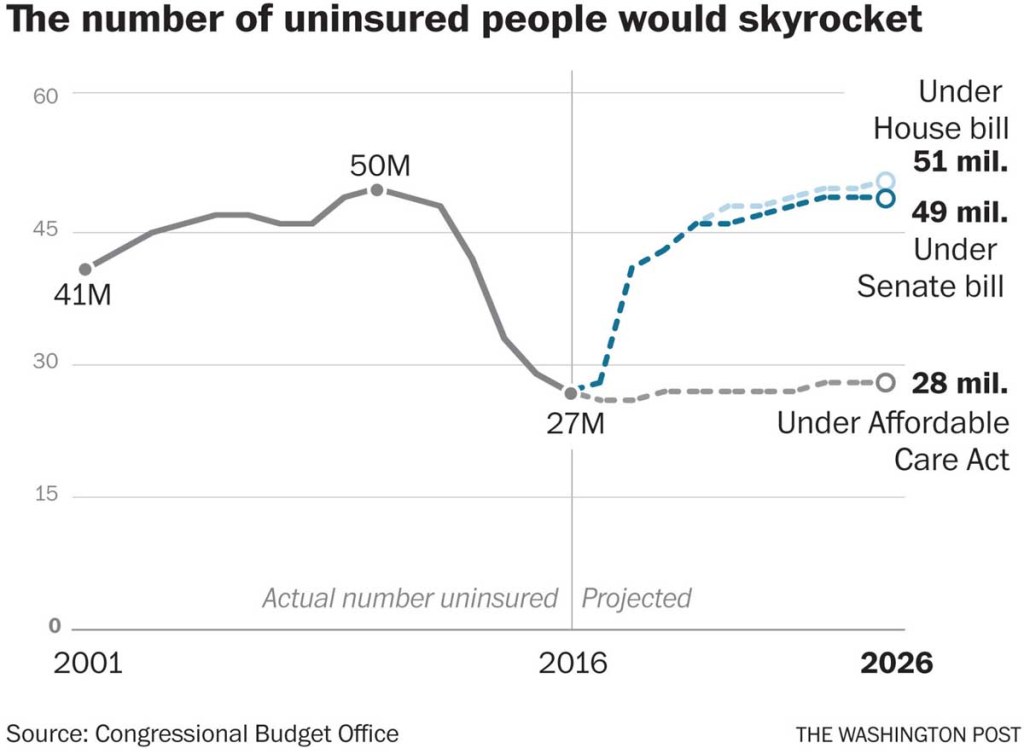Budget office: 22 million more uninsured under GOP health care bill
Published 7:51 am Tuesday, June 27, 2017

- CBO: Senate GOP health-care bill would leave 22 million more people uninsured by 2026
WASHINGTON – Senate Republicans, intent on revoking much of the nation’s first universal health care law, learned Monday their replacement legislation will leave 15 million more Americans uninsured next year.
And, the nonpartisan Congressional Budget Office estimated, that number will grow to 22 million more individuals without health insurance over the next decade, a number slightly below the 23 million more uninsured projected under the House bill.
The budget office, which analyzes the financial impact of legislation, said the Senate measure would decrease federal deficits by $321 billion over the decade by cutting subsidies to help the working poor buy insurance, and by reducing Medicaid spending.
Announcement of the CBO estimates came late in the afternoon on the heels of Senate GOP leaders reporting they had revised their original bill to impose a six-month waiting period on individuals who let their insurance coverage lapse for 63 days and then want to re-enroll in a plan.
The revision is aimed at encouraging healthy people to buy and keep their insurance and not think they could quickly obtain protection under the bill’s guarantee of coverage for pre-existing conditions if they got sick or had a serious medical need.
The Affordable Care Act, or Obamacare, dealt with that concern by imposing fines on individuals who did not purchase health insurance. Both the Senate and House bills scuttle that mandate.
The Congressional Budget Office report poses an obstacle to centrist Republican senators supporting the leaders’ bill. They are from states with thousands of working poor and individuals who got health insurance for the first time under Obamacare’s expansion of Medicaid.
The CBO said reducing subsidies to individuals who rely on them to help pay their health premiums, co-payments and deductibles would put the cost of insurance out of reach for most low-income people.
With Republicans holding only a 52-seat majority in the 100-seat Senate — and hesitation over the GOP bill coming from both centrists and conservatives — the leadership can afford only two defections for passage of the measure.
Moderate Republican Susan Collins of Maine expressed “serious concerns” about the proposal on national TV — in part because of it would raise premiums and deductibles for older people.
Most of the attention since Republican leaders rolled out their draft bill last Thursday has been on the proposed Medicaid changes. But Collins and health policy experts said they’re also anxious about changes in the insurance premium subsidies.
In the interest of cutting costs, the Senate bill would eliminate the subsidies for those making about $42,000 to $48,000 for a single person. The number of people who would be affected nationally was not available, but the Kentucky Center for Economic Policy estimated 32,000 individuals in that state would lose their subsidies.
The Senate plan decreases subsidies for older people making less than $42,000. Obamacare sets the subsidies so individuals pay no more than 9.9 percent of their income to purchase a low-deductible silver plan. The Republican bill would have older people paying between 12 and 17 percent of their income to buy bronze plan coverage, which has higher deductibles.
The Center on Budget and Policy Priorities, a nonprofit think tank, said its analysis of the Senate bill determined a single 60-year-old making $42,000 a year would pay $5,763 more in annual premiums in Oklahoma, $5,523 more in West Virginia, and an additional $5,151 in Pennsylvania. New Hampshire would see the lowest increase nationally, but the 60-year-old would still see a $4,471 increase.
At the same time, the CBPP report said, deductibles for 60ish individuals would increase by an average nationally of $3,000 to $6,000.
(Optional Trim)
A separate analysis by the nonpartisan Kaiser Family Foundation also found the change would have the biggest impact on older people, and those in rural areas where insurance costs are higher.
Supporters of the Senate Republican bill see the cut in subsidies for older people as a necessary tradeoff to raising them for younger people who need assistance to help pay for insurance.
A 25-year-old, for example, receiving a subsidy would see premium cost drop from $3,425 to $1,620 per year, the CBPP analysis concluded.
Premiums under Obamacare have skyrocketing in part because not enough young healthy people signed up for insurance to offset the cost of covering sick people and those with expensive medical conditions
Additionally, the Senate plan would allow those who make below to poverty level, $1,260 for a single person, to qualify for the subsidies. That would help childless adults in states like Georgia that allow only parents to qualify for Medicaid.
Four conservative Republican senators, including Rand Paul of Kentucky, have said they cannot support the Senate bill in its present form because it doesn’t lower premiums enough. Paul also said on TV Sunday the bill included too much money for subsidies.
He is proposing reducing premiums by eliminating Obamacare regulations, such as the mandate for coverage of maternity services, emergency room visits, mental health treatment and other so-called essential medical conditions.
Health care advocates are against slashing subsidies to people who need them. Emily Beauregard, executive director of Kentucky Voices of Health, said without subsidies health care would be inaccessible to thousands of Kentuckians.
Contact Washington reporter Kery Murakami at kmurakama@cnhi.com.





